
Journal of Educational Cultural and Psychological Studies
Scope & Guideline
Cultivating a Deeper Understanding of Cultural Dynamics in Education
Introduction
Aims and Scopes
- Inclusive Education and Teacher Support:
Research emphasizing the importance of inclusive educational practices and the support mechanisms necessary for teachers to effectively facilitate learning for all students, including those with special needs. - Empirical Research and Evidence-Based Practices:
The journal places a strong emphasis on empirical research that informs educational practices, utilizing quantitative and qualitative methodologies to assess the effectiveness of various teaching strategies. - Cultural Contexts in Education:
Exploration of the role of cultural influences on educational processes, including studies on intercultural education and the impact of cultural background on learning outcomes. - Psychological Aspects of Learning:
Investigation into psychological factors affecting education, including studies on student well-being, resilience, and the impact of teacher-student relationships on learning. - Innovations in Educational Technology:
Focus on the integration of technology in education, including the use of robotics, digital tools, and innovative teaching practices that enhance student engagement and learning outcomes. - Assessment and Measurement in Education:
Research on the development and application of assessment tools and strategies that measure student learning, skills, and competencies in various educational settings.
Trending and Emerging
- Mental Health and Well-being in Education:
An increasing number of studies focus on the mental health and well-being of both students and teachers, recognizing the importance of psychological factors in educational success and teacher retention. - Technology Integration in Learning Environments:
Research exploring the role of technology in education, including robotics and digital learning tools, has gained prominence, highlighting innovative approaches to enhance student engagement and learning outcomes. - Inclusive Practices and Diversity:
There is a rising interest in studies that promote inclusive education, addressing the needs of diverse learners and advocating for equitable teaching practices. - Critical Thinking and Problem-Solving Skills:
Recent publications emphasize the development of critical thinking and problem-solving abilities in students, reflecting a shift towards skills that prepare learners for real-world challenges. - Impact of Societal Issues on Education:
Emerging themes include the examination of how societal issues, such as the COVID-19 pandemic and social justice movements, influence educational practices and policies, suggesting a more contextual approach to educational research.
Declining or Waning
- Traditional Teaching Methods:
There has been a marked reduction in studies focusing on traditional or conventional teaching methods, possibly reflecting a broader shift towards innovative and technology-enhanced pedagogies. - Generalized Educational Theories without Empirical Support:
Research that discusses educational theories without empirical backing has decreased, as the journal increasingly prioritizes studies grounded in evidence and practical applications. - Homogeneous Education Models:
The focus on one-size-fits-all educational models has diminished, with more emphasis placed on personalized learning and inclusive practices that cater to diverse student needs. - Crisis Responses without Long-term Solutions:
There seems to be a decline in papers addressing immediate responses to educational crises (such as those prompted by the COVID-19 pandemic) without considering sustainable, long-term educational reforms. - Overarching Policy Discussions:
The journal appears to be moving away from broad discussions of educational policy in favor of more specific, actionable research that directly impacts educational practice and outcomes.
Similar Journals

LEARNING ENVIRONMENTS RESEARCH
Cultivating Knowledge for Effective Learning SpacesLearning Environments Research, an esteemed journal published by SpringerNature, occupies a pivotal position in the fields of Education, Communication, Developmental and Educational Psychology, and E-learning. With an ISSN of 1387-1579 and an E-ISSN of 1573-1855, this journal has demonstrated its scholarly impact, boasting a Q1 ranking in key categories according to the 2023 metrics. Its Scopus rankings further underscore its relevance, placing it in the top 10% of journals in Communication and 90th percentile among journals in Developmental and Educational Psychology. Learning Environments Research is dedicated to advancing the understanding of learning environments through innovative research and critical analysis, providing a platform for scholars, educators, and practitioners to explore effective educational practices. While currently not offered as an open-access publication, researchers can access a wealth of knowledge that reflects contemporary issues and research trends in education, ultimately fostering improved learning experiences worldwide. The journal’s ongoing commitment to excellence in research and its international perspective make it a valuable resource for anyone seeking to deepen their understanding of learning environments.
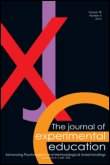
JOURNAL OF EXPERIMENTAL EDUCATION
Shaping the landscape of experimental education research.Journal of Experimental Education, published by Routledge Journals, Taylor & Francis Ltd, is a prestigious platform dedicated to advancing the field of educational research. With an impressive history spanning from 1932 to 2024, this journal covers significant developments in Developmental and Educational Psychology and Education, achieving a Q1 ranking in both categories for 2023. The journal is recognized for its rigorous peer-reviewed articles that explore innovative experimental methodologies and empirical studies that shape contemporary practices in education. Current Scopus rankings further establish its credibility, placing it in the top percentiles among its peers. While it is not an open-access journal, the insights offered through its publications are invaluable for researchers, educators, and students seeking to deepen their understanding of educational phenomena and improve pedagogical approaches. By fostering a community dedicated to research excellence, the Journal of Experimental Education serves as an essential resource for those committed to the advancement of education.
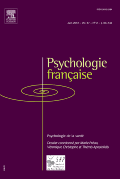
Psychologie Francaise
Cultivating Knowledge in the Heart of FrancePsychologie Francaise, published by Elsevier France - Éditions Scientifiques Médicales Elsevier, is a prominent journal in the field of psychology, specifically categorized within the realm of miscellaneous psychology. With its ISSN 0033-2984, the journal has been disseminating valuable research since its inception, contributing significantly to the academic discourse on psychological theories and practices. Although currently positioned in the Q4 category according to the 2023 quartile rankings, and with a Scopus rank of #179 out of 216 in the broader field of General Psychology, it serves as a crucial platform for emerging scholars and seasoned professionals alike to share innovative findings and insights that push the boundaries of psychological research. The journal operates from its base in Issy-les-Moulineaux, France, and has a commitment to fostering an inclusive dialogue around psychological science, despite its lack of open-access provisions. Over the years, Psychologie Francaise has continued to evolve, with a convergence period set to last through 2024, promising ongoing relevance and growth in one of the most profound and impactful fields of study.
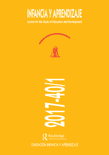
Journal for the Study of Education and Development
Advancing insights in education and development.The Journal for the Study of Education and Development, published by SAGE Publications Inc, is a leading academic peer-reviewed journal dedicated to advancing knowledge in the fields of educational and developmental psychology. Established in 1978 and operating through the United Kingdom, this journal provides a platform for contemporary research, theoretical discussions, and critical reviews that inform practices and policies in education. With an H-index reflecting its impact and citation metrics, it ranks in the Q3 category for both Developmental and Educational Psychology and Education as of 2023. Notably, it holds a Scopus rank of #722/1543 in Social Sciences - Education and #218/360 in Psychology - Developmental and Educational Psychology, placing it in the 53rd and 39th percentiles, respectively. The journal is committed to open access, ensuring that the insights found within its pages are readily available to researchers, professionals, and students alike. By contributing to ongoing dialogues and innovations in educational contexts, the Journal for the Study of Education and Development remains an essential resource for those looking to foster growth and development in educational settings.
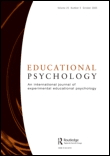
Educational Psychology
Bridging theory and practice in educational psychology.Educational Psychology is a leading peer-reviewed journal published by Routledge Journals, Taylor & Francis Ltd, dedicated to advancing the field of educational and developmental psychology. With its ISSN 0144-3410 and E-ISSN 1469-5820, this esteemed journal provides a platform for innovative research and critical discussions that explore the psychological aspects of learning processes, educational interventions, and cognitive development. Recognized for its quality, it holds an impressive Q1 category ranking in various fields, including Developmental and Educational Psychology, and is ranked in the top 10% of its category in Social Sciences Education and Experimental Psychology according to Scopus Metrics. Spanning from 1981 to 2024, the journal not only publishes rigorous empirical studies but also theoretical articles that contribute significantly to the understanding of educational practices globally. Researchers, educators, and students alike will find this journal an invaluable resource for cutting-edge developments in the intersection of psychology and education, enhancing their academic pursuits and professional growth.
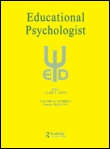
EDUCATIONAL PSYCHOLOGIST
Driving Educational Excellence Through Psychological UnderstandingEDUCATIONAL PSYCHOLOGIST, a leading journal published by Routledge Journals, Taylor & Francis Ltd, stands at the forefront of developmental and educational psychology. With an impressive impact factor and recognized as a Q1 journal in its field, it ranks #3 out of 360 in the Scopus category, placing it in the 99th percentile of journal performance. Since its inception in 1963, this esteemed publication has provided a platform for researchers, educators, and practitioners to share innovative studies, theoretical advancements, and practical applications focusing on learning processes and psychological development within educational contexts. Although it does not offer open access, the journal remains a vital resource for those looking to deepen their understanding of educational psychology and its impact on teaching and learning methodologies. Based in the United States, EDUCATIONAL PSYCHOLOGIST is essential reading for anyone committed to advancing knowledge in the field.
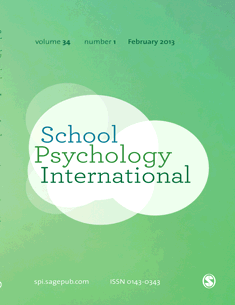
SCHOOL PSYCHOLOGY INTERNATIONAL
Leading the Conversation in School Psychology ResearchSCHOOL PSYCHOLOGY INTERNATIONAL is a leading academic journal published by SAGE Publications Ltd, focusing on the interdisciplinary fields of developmental and educational psychology, education, and psychiatry and mental health. With its origins dating back to 1979, this esteemed journal aims to advance the understanding and practice of school psychology by disseminating high-quality research and innovative practices that support the development and well-being of students globally. Recognized for its impact, it currently holds a Q2 ranking in Developmental and Educational Psychology, a Q1 ranking in Education, and a Q2 ranking in Psychiatry and Mental Health according to the latest 2023 quartile assessments. The journal's commitment to excellence is further evidenced by its impressive standings in Scopus Ranks, where it occupies significant percentiles across various categories. Scholars and practitioners looking to stay at the forefront of research in school psychology can access this journal for insights that explore critical issues faced within educational systems, making it an invaluable resource for advancing both theoretical and applied knowledge.

MIER-Journal of Educational Studies Trends and Practices
Exploring trends that transform teaching and learning.MIER-Journal of Educational Studies Trends and Practices is a pivotal academic journal dedicated to advancing the field of education, focusing on innovative research and trends that influence teaching and learning practices. Published by the esteemed MODEL INST EDUCATION & RESEARCH, this journal offers a platform for researchers, educators, and students to disseminate knowledge and insights on various educational methodologies, curricular developments, and pedagogical theories. While the journal's current impact factor is not specified, its commitment to fostering scholarly discourse positions it as a notable contributor to the field. With an ISSN of 0976-8203 and an E-ISSN of 2319-1945, MIER aims to promote open access to current educational research, making it accessible to a global audience. By engaging with contemporary educational issues and emerging practices, this journal serves as a valuable resource for those dedicated to enhancing educational outcomes and developing effective teaching strategies.
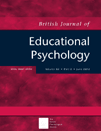
BRITISH JOURNAL OF EDUCATIONAL PSYCHOLOGY
Pioneering research for effective learning.The British Journal of Educational Psychology (BJEP), published by Wiley, stands as a leading platform in the fields of Developmental and Educational Psychology and Education. Since its inception in 1931, BJEP has consistently delivered high-quality, peer-reviewed research that addresses critical issues and advances knowledge within the educational sphere. With a commendable impact factor and a prominent Q1 ranking in both the Developmental and Educational Psychology categories, the journal boasts an impressive standing among its peers, reflected by its rankings in Scopus (Rank #101 out of 1543 in Social Sciences – Education and Rank #35 out of 360 in Developmental Psychology). Researchers, educators, and students alike will find valuable insights and innovative practices that shape learning and teaching in diverse contexts. Although currently not available as open access, the journal remains dedicated to disseminating pivotal findings that contribute to effective educational psychology practices worldwide. Explore the rich tapestry of knowledge that BJEP offers, crafted from contributions across the globe at the forefront of educational research.
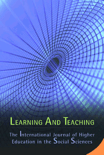
Learning and Teaching-The International Journal of Higher Education in the Social Sciences
Exploring New Frontiers in Teaching and Learning DynamicsLearning and Teaching: The International Journal of Higher Education in the Social Sciences, published by BERGHAHN JOURNALS, stands at the forefront of interdisciplinary scholarship dedicated to enhancing the pedagogical landscape within the social sciences. With its Open Access model established in 2020, this journal provides a vital platform for disseminating innovative research and best practices that contribute to the evolving dynamics of higher education. Operating from the United States, and noted for its relevance in Developmental and Educational Psychology, Education, and Sociology and Political Science, Learning and Teaching has achieved commendable rankings, positing it in the Q3 and Q2 quartiles in several categories as of 2023. This recognition underscores its importance as a resource for researchers, educators, and students alike, fostering a robust dialogue about teaching strategies, learning environments, and educational theories. By converging research and practice from 2017 to 2024, Learning and Teaching is poised to influence the future of education, preparing scholarly contributors to address the complexities of learning in the social sciences effectively.